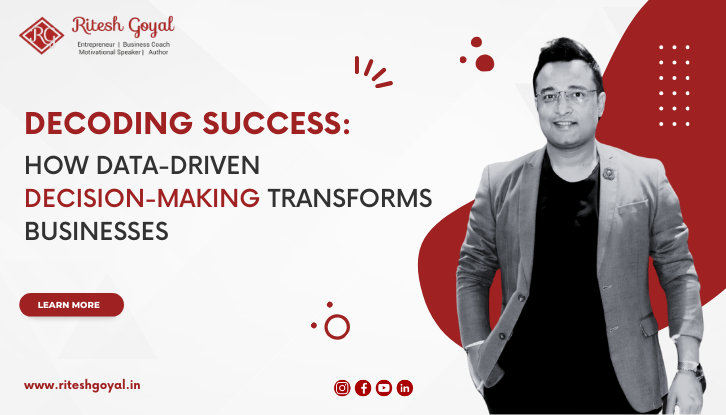
Decoding Success: How Data-Driven Decision-Making Transforms Businesses
Dear readers, I want to dive into a topic that has revolutionized the way businesses operate in the 21st century – Data-Driven Decision Making (DDDM). As the Founder and MD of GIBS Business School, a motivational speaker, and a business coach, I have witnessed firsthand the transformative power of data-driven approaches in various industries. In this blog, we will explore how DDDM empowers organizations to unlock their true potential, make informed choices, and achieve remarkable success.
The Rise of Data in Business:
In recent years, data has become the lifeblood of successful organizations. We are living in the age of information, where businesses are generating and collecting vast amounts of data every day. This data encompasses customer behavior, market trends, operational processes, financial metrics, and much more. However, raw data alone is not enough; the real magic lies in harnessing this data effectively.
Understanding Data-Driven Decision-Making:
Data-Driven Decision Making is a methodical approach that involves collecting and analyzing data to make informed and objective choices. Rather than relying on gut feelings or intuition, businesses are now turning to data to guide their strategies and actions. It’s not about replacing human judgment; instead, it complements it with valuable insights and evidence.
The Benefits of Data-Driven Decision-Making:
-
Enhanced Accuracy and Precision:
When decisions are based on data analysis, the likelihood of errors and guesswork diminishes significantly. Businesses can pinpoint trends and patterns that might have been overlooked otherwise.
-
Improved Strategic Planning:
Data-driven insights provide a clearer picture of the market landscape, enabling businesses to identify opportunities and potential risks. This empowers organizations to create well-informed and adaptable strategic plans.
-
Customer-Centric Approach:
By understanding customer behavior through data analysis, businesses can tailor their products and services to meet specific customer needs. This customer-centric approach fosters loyalty and satisfaction.
-
Cost Optimization:
Data-Driven Decision Making helps identify areas where resources are underutilized or misallocated, leading to more efficient resource management and cost savings.
-
Agility and Innovation:
Data-driven organizations can respond more quickly to changing market dynamics, giving them a competitive edge. It also encourages innovation as decisions are backed by concrete evidence.
Challenges in Implementing Data-Driven Decision-Making:
While the advantages of Data-Driven Decision Making are evident, adopting this approach comes with its challenges:
-
Data Quality and Integration:
Data must be accurate, reliable, and consistent for meaningful insights. Integrating data from various sources can be complex but is crucial for comprehensive analysis.
-
Data Security and Privacy:
With the increasing reliance on data, businesses must prioritize data security and ensure compliance with data privacy regulations.
-
Cultural Shift:
Embracing a data-driven culture requires a mindset change within the organization. Employees need to be encouraged to trust data and use it to drive decision-making.
Data Analytics Tools and Technologies:
To effectively implement Data-Driven Decision Making, businesses need the right tools and technologies. Advanced analytics platforms, machine learning algorithms, and data visualization tools are essential components of a successful data-driven strategy.
Conclusion:
Data-Driven Decision Making has proven to be a game-changer for businesses across the globe. As the Founder and MD of GIBS Business School, I encourage aspiring entrepreneurs and seasoned business leaders to embrace this transformation. By making data a cornerstone of your decision-making process, you can unlock your business’s true potential and achieve unprecedented success. Remember, it’s not just about data; it’s about using data intelligently to fuel innovation, efficiency, and growth. Here’s to a data-driven future!
I hope you found this blog insightful and motivating. If you have any questions or want to share your thoughts, feel free to leave a comment below. Until next time, stay inspired and keep decoding success!
FAQs
Q. What is Data-Driven Decision Making (DDDM), and how does it benefit businesses?
A. Data-Driven Decision Making is an approach that involves collecting and analyzing data to make informed choices in business operations and strategies. It benefits businesses by enhancing accuracy and precision, improving strategic planning, fostering a customer-centric approach, optimizing costs, and promoting agility and innovation.
Q. How does DDDM complement human judgment in decision-making processes?
A. Data-Driven Decision-Making (DDDM) doesn’t aim to replace human judgment; instead, it complements it with valuable insights and evidence from data analysis. It empowers decision-makers with concrete information, making their judgments more informed and objective.
Q. What are some of the challenges businesses may face in implementing Data-Driven Decision Making?
A. Implementing Data-Driven Decision-Making (DDDM) comes with challenges, such as ensuring data quality and integration from various sources, addressing data security and privacy concerns, and fostering a cultural shift within the organization to embrace a data-driven mindset.
Q. How can Data Analytics Tools and Technologies assist in the successful adoption of DDDM?
A. Data Analytics Tools and Technologies play a crucial role in the successful adoption of DDDM. Advanced analytics platforms, machine learning algorithms, and data visualization tools help businesses analyze and interpret data effectively, enabling them to derive meaningful insights and make data-driven decisions.
Q. How does DDDM contribute to a more customer-focused business strategy?
A. DDDM allows businesses to analyze customer behavior and preferences through data analysis. By understanding customer needs and expectations better, businesses can tailor their products and services, leading to a more customer-focused approach that fosters loyalty and satisfaction.
